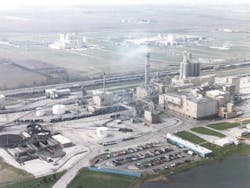Global Food & Beverage firm completes shift from Coal to Gas-fired CHP at Milling Plants
By Rod Walton, EnergyTech Senior Editor
UK-based food and beverage giant Tate & Lyle has completed its shift from coal-fired to gas-fired power for its manufacturing operations worldwide four years early.
Tate & Lyle reported this week that its $150 million decarbonization global plan reached its on-site power goal this year, well ahead of the original 2025 target. The company replaced coal power with natural gas combined heat and power (CHP) generation at six corn wet mills in Tennessee, Illinois and Indiana.
With the decommissioning of the final coal system at the Decatur, Illinois plant last month, Tate & Lyle delivered on its commitment.
“Moving away from onsite coal consumption is a key part of our sustainability program to drive a significant reduction in our Scope 1 and 2 greenhouse gas emissions,” Sara Leeman, Tate & Lyle’s global environmental lead, said in a statement. “We have now fully decommissioned all onsite coal systems at our sites.”
As well as delivering significant environmental and economic improvements, the elimination of coal-based energy at these sites means less water will be used and local communities will benefit from improved air quality and less truck traffic, according to the company. The natural gas is delivered via pipeline to the mills’ CHP plants.
Tate & Lyle also is having a new biomass boiler constructed at its acidulants plant in Santa Rosa, Brazil.
The company’s announcement comes during the same period as the COP26 environmental summit which occurred in the United Kingdom this week.
“We recognize the need for businesses to play their part in reducing global greenhouse gas emissions,” Tate & Lyle CEO Nick Hampton said. “By eliminating the use of coal-based energy in all our plants we have taken a significant step forward in our sustainability journey. We know we can, and need, to do more in the weeks, months and years ahead, and are committed to living our purpose, of which caring for our planet is a key pillar.”
Tate & Lyle produces food and beverage sweeteners, texturants and dietary fibers. It employs more than 4,400 people in 30 countries.
(EnergyTech Senior Editor Rod Walton is a 30-year veteran and newspaper and trade journalism. He can be reached at [email protected] and 412-376-7454).
About the Author
EnergyTech Staff
Rod Walton is head of content for EnergyTech.com. He has spent 17 years covering the energy industry as a newspaper and trade journalist.
Walton formerly was energy writer and business editor at the Tulsa World. Later, he spent six years covering the electricity power sector for Pennwell and Clarion Events. He joined Endeavor and EnergyTech in November 2021.
He can be reached at [email protected].
EnergyTech is focused on the mission critical and large-scale energy users and their sustainability and resiliency goals. These include the commercial and industrial sectors, as well as the military, universities, data centers and microgrids.
Many large-scale energy users such as Fortune 500 companies, and mission-critical users such as military bases, universities, healthcare facilities, public safety and data centers, shifting their energy priorities to reach net-zero carbon goals within the coming decades. These include plans for renewable energy power purchase agreements, but also on-site resiliency projects such as microgrids, combined heat and power, rooftop solar, energy storage, digitalization and building efficiency upgrades.
